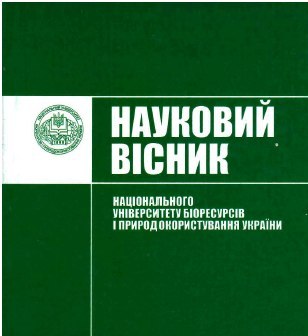Classification of lexemes denoting persons (on the basis of "total glossary Of words from Ivan Franko's writings")
DOI:
https://doi.org/10.31548/philolog0(257).2016.074%20-%2082Abstract
Introduction. Lexemes denoting persons are of great interest to researchers. Such kind of lexemes are presented in Ivan Franko's complete works. A large part of them is given in modern lexicographical sources; the other part of words is less understandable for a speaker, that's why the actuality of the problem is evident.
The aim of the article is to analyse persons' names taking into consideration their semantics, motivational basis, their origin, development, stylistic meaning and their functioning in Ivan Franko's writings.
Methods of Investigation. The main method of investigation is structural. It is used to determine the most productive word-building patterns of derivatives. Analytico-descriptive method is used to find out structural and word-building peculiarities of persons' names.
Investigation Results. The analysis of persons' names determined the most productive word-building patterns. They are the patterns with -nyk and -ar endings.Derivatives with -nyk-suffix are presented by ten word-building patterns.Derivatives with -ar-suffix are presented by three word-building patterns. The basis for derivatives are mostly nouns, less often - verbs.
The author singles out thematic and lexico-semantic groups in the limits of the semantic classification. The investigation of lexico-semantic groups of persons' names determined preferential usage of outdated words. Some of them fell out of active use because of the disappearance of these professions, occupatons, trades. Other names have synonyms-corespondents in the Modern Ukrainian language. The third group comprises names that function nowadays. From the poin of view of their usage the author singled out such types of archaic words: lexico-phonetical and lexico-word-building. One more type of archaic words is presented by semantic archaic words. They are old words which acquire new meanings in the Modern Ukrainian language. According to their origin the author singles out parent Slavic lexemes and borrowed lexemes (from Polish, German, Greek, Latin, Hebrew). The author also examines words which don't belong to literary language: dialectal words, vulgarisms, slangisms and words with negative connotations (scornful and ironic connotations).
The Author's Personal Contribution. The author was the first person who collecyted and examined a great number of lexemes denoting persons, which are presented in the Ivan Franko's complete works. The author also carried out complex investigation of persons' names according to their semantics, word-building peculiarities, origin, frequency of usage, stylistic meanings.
Conclusion. The lexemes denoting persons' names testify Ivan Franko's genius and greatness, his many-sided talent. The investigation of the writer's idiolect can activize non-productive word-building pattersand to revive "forgotten, repressed" Ukrainian lexemes.
References
Boychuk, V. (2012). Comparative-onomasiological characteristics of desubstantivized nouns-persons' names according to their profession in the Ukrainian and the English languages. Movoznavchyi visnyk : zb. nauk. pr. / Vidp. red. H. I. Martynova. (Linguistic Herald: collection of scientific works/ Ed. by A. I. Martynova). Cherkasy. 2012. 14-15, 68-75 (in Ukr.)
Volynets, G. (2008). Peculiarities of persons' names of common gender with zero-suffix. Linhvistychni studii. (Linguistic Studios). Donetsk. 17, 150-154 (in Ukr.)
Godovana, M. P. (2009). Glossary of persons' names according to the type of activity. K.: Naukova Dumka. 176 (in Ukr.)
Kyslyuk, L. (2008). New life of repressed words. Svitohliad. (Svitoglyad). 2, 80 (in Ukr.)
Kyslyuk, L. (2012). The usual and the occasional in the author's neologisms denoting persons' names Movoznavchyi visnyk : zb. nauk. pr. / Vidp. red. H. I. Martynova. (Linguistic Herald: collection of scientific works/ Ed. by A. I. Martynova). Cherkasy. 14-15, 56-62 (in Ukr.)
Puzyrenko, Ya. V. (2005). Agent-professional women's names in lexico-graphical description and in usage: Synopsis of the dissertation for a candidate degree in philology, speciality 10.02.15 - general linguistics. K. 21(in Ukr.)
Savelyeva, L. (2007). Ethno-culturally determined patterns of forming nouns-persons' names according to their place of living. Movoznavchyi visnyk : zb. nauk. pr. / Vidp. red. H. I. Martynova. (Linguistic Herald: collection of scientific works/ Ed. by A. I. Martynova). Cherkasy. 5, 121-122 (in Ukr.)
Styshov, O. A. (2005). Ukrainian vocabulary of the end of the XXth century: (On the material of Mass Media) [2nd edition]. K.: Pugach, 388 (in Ukr.)
Tomilenko, L. M. (2014). Persons' names according to the type of their activity in the Ukrainian translated lexicography of 1918-1933. Access//: eprints.zu edu.ua (in Ukr.)
Kharchenko, S. V. (2014) Aktualni pytannia kodyfikatsii syntaksychnoi normy ukrainskoi literaturnoi movy v slovnyku [Current issues of codification of syntactic rules of the Ukrainian language in the dictionary] Ukrainian studies VI. Modern Ukrainian. Issues of language, literature and culture. AUPO. Faculty of Philosophy. Philology 103-2014. - Olomouc: Palacky University in Olomouc, 90-93.
Downloads
Published
Issue
Section
License
Relationship between right holders and users shall be governed by the terms of the license Creative Commons Attribution – non-commercial – Distribution On Same Conditions 4.0 international (CC BY-NC-SA 4.0):https://creativecommons.org/licenses/by-nc-sa/4.0/deed.uk
Authors who publish with this journal agree to the following terms:
- Authors retain copyright and grant the journal right of first publication with the work simultaneously licensed under a Creative Commons Attribution License that allows others to share the work with an acknowledgement of the work's authorship and initial publication in this journal.
- Authors are able to enter into separate, additional contractual arrangements for the non-exclusive distribution of the journal's published version of the work (e.g., post it to an institutional repository or publish it in a book), with an acknowledgement of its initial publication in this journal.
- Authors are permitted and encouraged to post their work online (e.g., in institutional repositories or on their website) prior to and during the submission process, as it can lead to productive exchanges, as well as earlier and greater citation of published work (See The Effect of Open Access).

